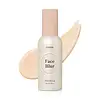What's inside
What's inside
 Key Ingredients
Key Ingredients

No key ingredients
 Benefits
Benefits

 Concerns
Concerns

 Ingredients Side-by-side
Ingredients Side-by-side

Water
Skin ConditioningButylene Glycol Dicaprylate/Dicaprate
EmollientDimethicone
EmollientCyclopentasiloxane
EmollientEthylhexyl Methoxycinnamate
UV AbsorberCyclohexasiloxane
EmollientButylene Glycol
HumectantTrisiloxane
Skin ConditioningTitanium Dioxide
Cosmetic ColorantNiacinamide
SmoothingLauryl PEG-9 Polydimethylsiloxyethyl Dimethicone
Skin ConditioningZinc Oxide
Cosmetic ColorantDimethicone/Vinyl Dimethicone Crosspolymer
Skin ConditioningDisteardimonium Hectorite
StabilisingSilica
AbrasiveSodium Chloride
MaskingPEG-10 Dimethicone
Skin ConditioningVinyl Dimethicone/Methicone Silsesquioxane Crosspolymer
CI 77891
Cosmetic Colorant1,2-Hexanediol
Skin ConditioningMica
Cosmetic ColorantAluminum Hydroxide
EmollientStearic Acid
CleansingPolymethyl Methacrylate
Parfum
MaskingGlyceryl Caprylate
EmollientEthylhexylglycerin
Skin ConditioningTriethoxycaprylylsilane
Disodium EDTA
CI 77492
Cosmetic ColorantAdenosine
Skin ConditioningCI 77491
Cosmetic ColorantMethicone
EmollientTocopherol
AntioxidantWater, Butylene Glycol Dicaprylate/Dicaprate, Dimethicone, Cyclopentasiloxane, Ethylhexyl Methoxycinnamate, Cyclohexasiloxane, Butylene Glycol, Trisiloxane, Titanium Dioxide, Niacinamide, Lauryl PEG-9 Polydimethylsiloxyethyl Dimethicone, Zinc Oxide, Dimethicone/Vinyl Dimethicone Crosspolymer, Disteardimonium Hectorite, Silica, Sodium Chloride, PEG-10 Dimethicone, Vinyl Dimethicone/Methicone Silsesquioxane Crosspolymer, CI 77891, 1,2-Hexanediol, Mica, Aluminum Hydroxide, Stearic Acid, Polymethyl Methacrylate, Parfum, Glyceryl Caprylate, Ethylhexylglycerin, Triethoxycaprylylsilane, Disodium EDTA, CI 77492, Adenosine, CI 77491, Methicone, Tocopherol
 Reviews
Reviews

Ingredients Explained
These ingredients are found in both products.
Ingredients higher up in an ingredient list are typically present in a larger amount.
Cyclopentasiloxane, or D5, is a silicone used to improve texture of products and trap moisture.
D5 is considered lightweight and volatile. Volatile means it evaporates quickly after application. Once evaporated, D5 leaves a thin barrier that helps keep skin hydrated.
It is also an emollient. Emollients help soften the skin and prevent water loss. Silicones create a silky texture in products. D5 helps other ingredients become more spreadable.
Studies show D5 is safe to use in skincare products. We recommend speaking with a skincare professional if you have concerns.
Learn more about CyclopentasiloxaneThis ingredient is a silicone used to improve the texture of products and absorb oil. It does not get absorbed into the skin.
Like other silicones, Dimethicone/Vinyl Dimethicone Crosspolymer helps condition the skin by creating a barrier. In this sense, it can act as an emollient and trap moisture in.
This ingredient is a type of elastomer.
Learn more about Dimethicone/Vinyl Dimethicone CrosspolymerEthylhexylglycerin (we can't pronounce this either) is commonly used as a preservative and skin softener. It is derived from glyceryl.
You might see Ethylhexylglycerin often paired with other preservatives such as phenoxyethanol. Ethylhexylglycerin has been found to increase the effectiveness of these other preservatives.
Parfum is a catch-all term for an ingredient or more that is used to give a scent to products.
Also called "fragrance", this ingredient can be a blend of hundreds of chemicals or plant oils. This means every product with "fragrance" or "parfum" in the ingredients list is a different mixture.
For instance, Habanolide is a proprietary trade name for a specific aroma chemical. When used as a fragrance ingredient in cosmetics, most aroma chemicals fall under the broad labeling category of “FRAGRANCE” or “PARFUM” according to EU and US regulations.
The term 'parfum' or 'fragrance' is not regulated in many countries. In many cases, it is up to the brand to define this term.
For instance, many brands choose to label themselves as "fragrance-free" because they are not using synthetic fragrances. However, their products may still contain ingredients such as essential oils that are considered a fragrance by INCI standards.
One example is Calendula flower extract. Calendula is an essential oil that still imparts a scent or 'fragrance'.
Depending on the blend, the ingredients in the mixture can cause allergies and sensitivities on the skin. Some ingredients that are known EU allergens include linalool and citronellol.
Parfum can also be used to mask or cover an unpleasant scent.
The bottom line is: not all fragrances/parfum/ingredients are created equally. If you are worried about fragrances, we recommend taking a closer look at an ingredient. And of course, we always recommend speaking with a professional.
Learn more about ParfumChances are, you eat sodium chloride every day. Sodium Chloride is also known as table salt.
This ingredient has many purposes in skincare: thickener, emulsifier, and exfoliator.
You'll most likely find this ingredient in cleansers where it is used to create a gel-like texture. As an emulsifier, it also prevents ingredients from separating.
There is much debate on whether this ingredient is comedogenic. The short answer - comedogenic ratings don't tell the whole story. Learn more about comegodenic ratings here.
The concensus about this ingredient causing acne seems to be divided. Research is needed to understand if this ingredient does cause acne.
Scrubs may use salt as the primary exfoliating ingredient.
Learn more about Sodium ChlorideWater. It's the most common cosmetic ingredient of all. You'll usually see it at the top of ingredient lists, meaning that it makes up the largest part of the product.
So why is it so popular? Water most often acts as a solvent - this means that it helps dissolve other ingredients into the formulation.
You'll also recognize water as that liquid we all need to stay alive. If you see this, drink a glass of water. Stay hydrated!
Learn more about Water